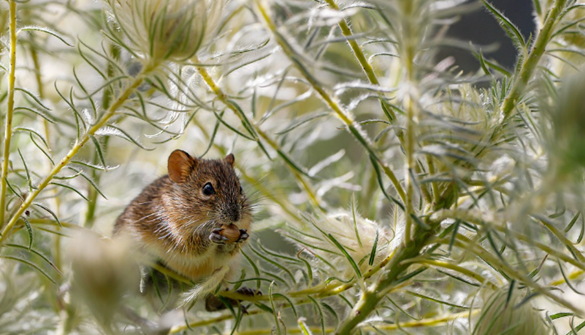We’ve all seen those adorable cartoons and children’s stories featuring mice as friendly, helpful characters. But the truth is, mice can pose a serious threat to your home and health. It’s time to dispel the myth of the cute mouse and understand why extermination is essential.
Damage to Homes
Mice can cause significant damage to your home in a variety of ways. They are notorious for chewing on wires and insulation, which can lead to electrical problems, fires, and even short circuits. They can travel through the walls and if you ask “Do mice go upstairs?” the answer is that they definitely do and will infest all of the floors of a home. Additionally, mice contaminate food and water supplies by leaving behind droppings and urine, making it unsafe for consumption. Their droppings can also attract insects and moisture, leading to structural damage, mold growth, and unpleasant odors.
The economic costs associated with a mouse infestation can be substantial. You may need to spend money on repairs, replacements, and professional extermination services. In severe cases, insurance premiums may also increase.
Agricultural and Ecological Impacts of Mice
Mice can pose a significant threat to agricultural productivity, causing substantial economic losses for farmers. They consume various crops, damaging plants and reducing yields. Mice can also gnaw on roots and stems, hindering plant growth and survival. Additionally, they contaminate stored grains and other agricultural products with their droppings and urine, making them unfit for consumption. These damages can lead to financial losses, food shortages, and decreased livelihoods for farmers.
Beyond their impact on agriculture, mice can disrupt ecosystems. They compete with native species for resources, leading to population declines and habitat loss. Mice can also transmit diseases to other animals, potentially causing significant ecological damage. While mice can be prey for predators, they can also prey on small animals and eggs, disrupting the food chain. The ecological consequences of mice infestations can be far-reaching, affecting biodiversity and ecosystem health.
Health Risks
Mice are carriers of various diseases, including:
- Hantavirus: A potentially fatal respiratory illness transmitted through airborne particles from infected mouse droppings, urine, or saliva.
- Salmonella: A bacterial infection that causes food poisoning, leading to symptoms like diarrhea, fever, and abdominal cramps.
- Lymphocytic choriomeningitis: A viral infection that can cause flu-like symptoms, meningitis, and encephalitis.
- Plague: A bacterial infection transmitted by fleas from infected rodents, which can be fatal if left untreated.
Beyond diseases, mice can also trigger allergies and asthma. Their dander and allergens can irritate the respiratory system, leading to symptoms such as sneezing, coughing, and difficulty breathing.
The psychological impact of a mouse infestation should not be overlooked. The presence of mice in your home can cause fear, anxiety, and stress, affecting your overall well-being.
Natural Repellents and Community-Wide Efforts
While natural repellents may not be as effective as professional extermination, they can be a helpful tool in deterring mice. Some popular options include:
- Peppermint oil: Mice dislike the strong scent of peppermint oil. You can apply it to cotton balls or rags and place them in areas where mice are likely to enter.
- Lavender: Lavender is another natural repellent that mice find unpleasant. You can use lavender essential oil or dried lavender flowers.
- Cedarwood: Cedarwood is a natural wood that emits a strong scent that repels mice. You can use cedarwood oil or place cedarwood blocks in areas where mice are active.
Remember, while natural repellents can be effective, they may not eliminate a severe infestation. It’s essential to combine natural repellents with other prevention methods and consider professional extermination if the problem persists.
Community-Wide Efforts
Controlling rodent populations often requires a community-wide approach. Public sanitation programs and pest control initiatives can play a significant role in reducing the number of mice in a given area.
- Public sanitation: Ensuring clean and sanitary conditions in public spaces, such as parks, sidewalks, and alleys, can help prevent mice from thriving. Regular trash collection, proper waste disposal, and maintaining clean public areas are essential.
- Pest control initiatives: Community-wide pest control programs can help to target rodent populations. This may involve the use of professional exterminators, public education campaigns, and coordinated efforts to eliminate breeding grounds.
By working together, communities can significantly reduce the impact of mice and improve public health and safety.
The Importance of Extermination
Professional exterminators have the expertise and tools necessary to effectively eliminate mice from your home. They can identify entry points, set traps, and apply bait to target the infestation. Extermination is crucial to protect your health and property from the damage and risks associated with mice.
Prevention is also key. By sealing cracks and crevices in your home, keeping food areas clean, and storing food in airtight containers, you can reduce the likelihood of a mouse infestation. However, if you do find yourself dealing with mice, it’s important to seek professional help.
In conclusion, the myth of the cute mouse is far from reality. Mice can cause significant damage to homes and pose serious health risks. Extermination is necessary to protect your well-being and property. By taking proactive steps to prevent infestations and seeking professional help when needed, you can ensure a rodent-free home.

Recent Comments